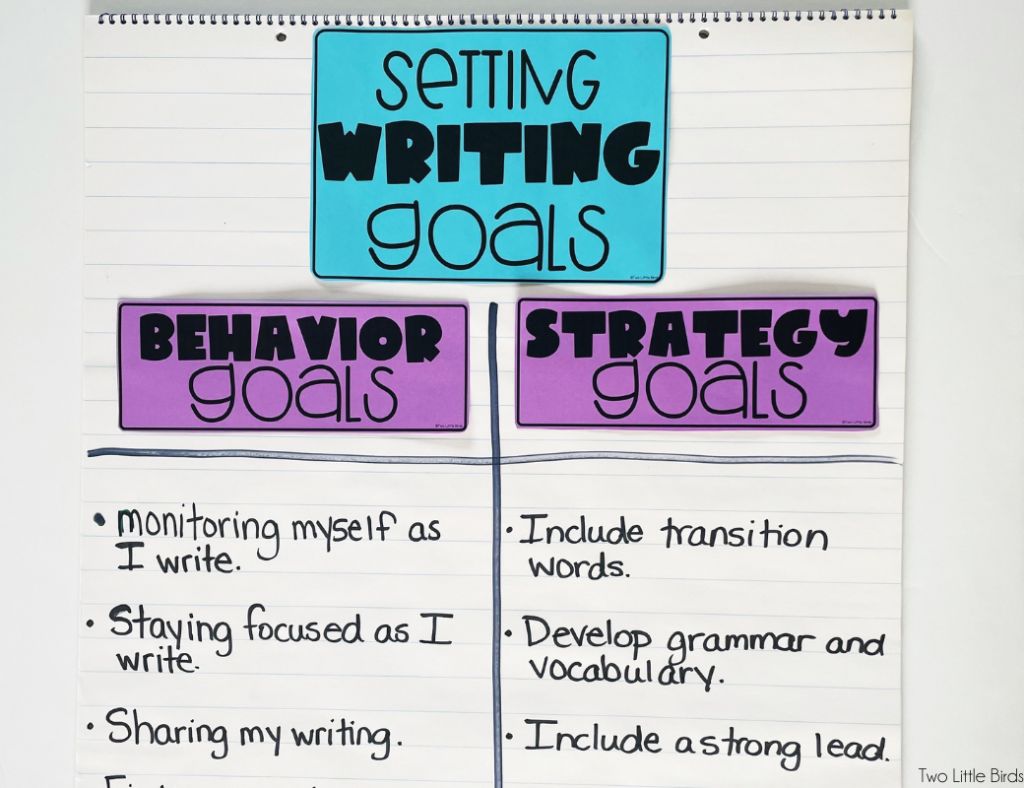

[ :: persist :: knight of pentacles :: ]


This is the second year I have chosen a tarot card for the year. Last year my card was 7 of Pentacles, and it made good sense that 8 of Pentacles should follow (not all the cards flow this way).

For a very truncated version of card meanings, I’ll pull from astrology.com. “The Seven of Pentacles is one of the minor arcana cards that represents patience, diligence, and hard work… [it] is a reminder… to be patient and… continue working.” The 7 of Pentacles is about hard work and faith. “Have faith that [your] efforts will bear fruit in the future.” Each year I try to find new ways to dig deeper into my writing practice and rededicate myself to it. Each year I think, maybe this will be the year.
Here’s how I see it these days: I will never be the author who puts out several books a year, or even a single book each year. Like Harper Lee, I like to think I’ll be the kind of author who puts out one or two really good books in their lifetime. And I’m comfortable with that. I’m a slow, plodding, perfectionist and where my writing is concerned, I err on the side of caution.
In this case, it flows naturally that the card after 7 is 8. “The Eight of Pentacles is another minor arcana card that represents hard work and determination… It signifies that the person is in a period of intense concentration and focusing their energy on mastering a skill… [It] is a reminder… to remain focused on their goals and work hard to achieve them.”
I’m working on the book until it’s done. However long that takes. I want to dissolve into this work with complete flow and dedication. Whatever it takes. And I want to feel like I’m prioritizing it the way it deserves, which I never seem to do adequately enough to satisfy my high standards.
“Together, the Seven of Pentacles and Eight of Pentacles tarot card combination is a reminder that success is achieved through hard work and patience. The querent needs to remain focused on their goal and be willing to put in the effort required to achieve it. This combination is a sign that success is within reach, and the querent needs to keep working hard to achieve it.”
I believe it, I receive it, and I will continue my hard work.
Thanks.
I have been considering three contenders for my word of the year for 2024. (Check it out here if you want to know more about choosing a word of the year.) I had narrowed my choices to: solitude, quietude, and stillness. As an extrovert and a caregiver, I tend to (0ver)fill my time with friends and family and helping others. It’s great fun! But, I rarely get around to spending time by myself being still or quiet. As a writer that doesn’t work well. As a person who wants to journal or meditate, that doesn’t work well either. So, with chaos all around me, I’ve been feeling I’d like to try to cultivate a little time and space for peace and some zazen. But I’ve been having trouble selecting the final choice. It seems that still and quiet suggest one another, and maybe solitude (and the Sacred Alone from my hero Susannah Conway) suggests them both. I decided Jan 1 wasn’t going to work for me this year and gave myself some grace to explore the terms more fully.
quietude
solitude
stillness
I started exploring the words. First with definitions. Then with images. Then with quotes. I’d like to share a few of the best ones I found. Please know that none of these images or quotes belong to me.
Potential 1:
Quietude




Potential 2:
Solitude






Potential 3:
Stillness











I found that, while solitude and quietude have some fans, stillness is a way of life that others have written books about. There are countless quotes that employ the word. And there are many, many visual images of what we as people think this concept looks like and feels like. I appreciate that there’s deep well to explore that comes along with this single word. There is enough content, enough material, to take the year exploring. So I have embraced this choice and chosen stillness as my woty 2024. But I wouldn’t have reached that place without exploring all three, and I think quietude and solitude will continue to be supportive concepts I return to throughout the year.
Have you chosen a word? How did you go about it? Do you feel good about your choice? (If not, you can always pick again!)
Love,
Jobe
Honorable Mention:
Serenity


Honorable Mention:
Silence



In Tarot, the death card can seem pretty scary. But all endings are also beginnings. The end of one day is the beginning of the next. The end of one chapter is the beginning of the next. As we approach the end of 2023 and the beginning of 2024, it feels like the perfect time to talk about goals. What were your writing goals this past year, and what will your new writing goals look like moving forward? I often make the mistake of thinking of my goals too broadly, without enough detail to nail them down. I might think to myself: this year I’ll finish my manuscript, get it all cleaned up, and get it published! And then I don’t do that. Why? Because there’s no specificity. Goals famously need to be five things:
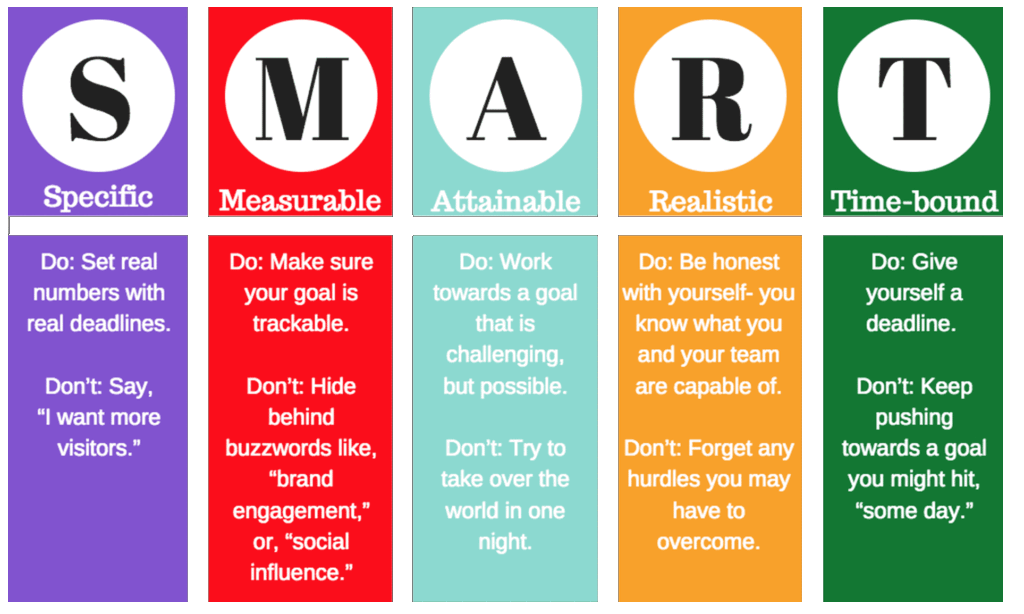

It isn’t enough to say “I’ll finish my manuscript.” Instead, try saying, “I’ll write one new chapter every month until every chapter has been drafted.” That specific. And in order to achieve one new chapter every month, what will that require? Maybe “I’ll write one hour in the morning and one hour in the evening every weekday, M-F.” That’s something you can measure. Did I write for one hour this morning? I can answer yes or no. That’s measurable. Maybe two hours a day is too many. Maybe I need to try writing in the morning and the evening to see which works better for me, and pick the one that works better. Or maybe I can only write MWF and on weekends. Whatever I figure out that I can actually accomplish. And of course, there’s a deadline.
Here are some examples of starting points you could use to begin developing your writing-related goals:
1. Outline your book
2. Research for your book
3. Try tools such as Scrivener or Grammarly
4. Overcome writer’s block (writing prompts and other methods)
SOURCE
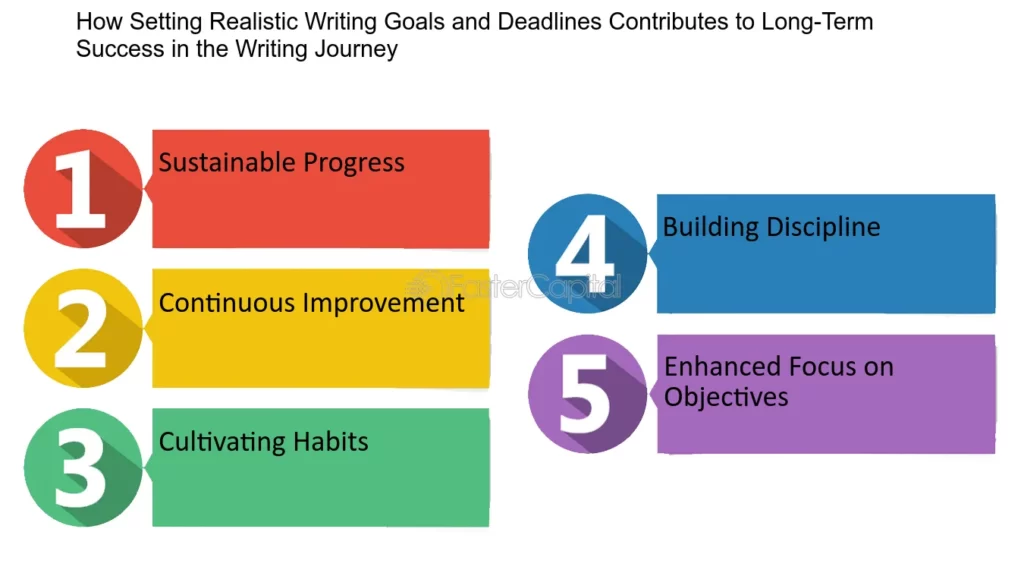
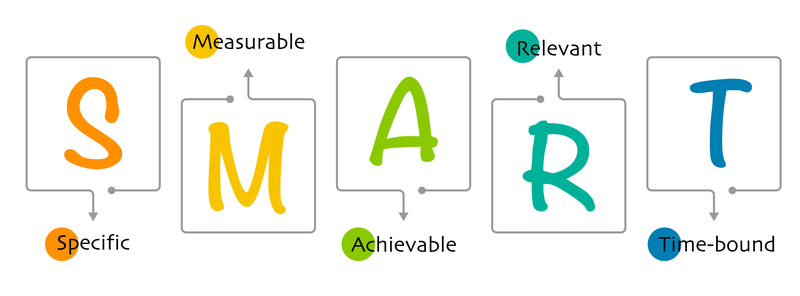
Another modification of the SMART goals uses SMARTER goals, adding “evaluable” and “rewarding.” Example: I will self-publish an anthology of my writing by December 2024. Try:
1. Word Counts
2. Break up a big project into milestones
3. USE DEADLINES
4. If you’re trying to make money, keep track of how much you’re making
5. If you’re trying to accumulate publications, keep track of how many items you’re getting published
If you’re new to setting writing goals: set one around a daily word-count or time spent writing. Alternatively, set a writing goal based around a deadline.
SOURCE

Here is an example of Marcie the Maven’s breakdown of writing goals SOURCE
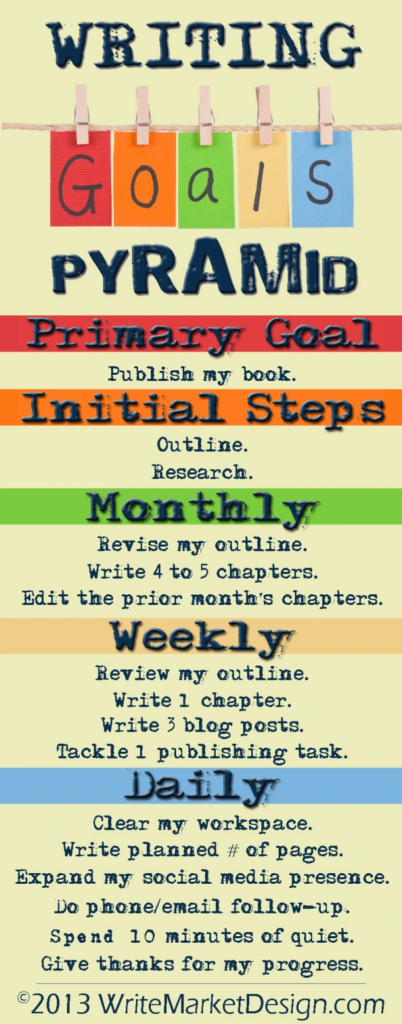
Consider different kinds of writing goals:
1. Lifetime Writing Goals. What will you regret if you never accomplish? I have also heard this question asked “What does success look like to you?”
2. This year’s writing goal(s). One goal I’ve heard and liked is “collect 100 rejection letters.” Rejection letters are a fantastic way to celebrate that you are living the life. Rejection is a very normal part of being a writing if you have any desire to publish. Why not celebrate the accumulation of rejection letters!
Another version of this is to send 100 query letters.
Another goal, famously suggested by Ray Bradbury, is to write 1 short story every week for a year. According to Bradbury, no one can write 52 bad short stories in a row.
3. Weekly goals
4. Daily goals

Here’s the worksheet made by this SOURCE, which also recommends:
1. reflect
2. reconnect
3. what will you quit
4. pick 2 (no more than that!)
5. deadline + consequence

Last but not least, check out Pro Writing Aid:

Also try:
1. Small things
2. Link it with something you already do
3. Accountability
4. Write it down and track it
5. Quantity leads to Quality (WRITE A LOT)
6. Journal, Share, Celebrate your progress!
SOURCE

Last but not least this one was from a kids writing site, but it actual seems pretty insightful for adults too! SOURCE
